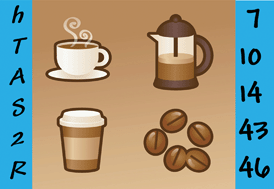 Scientists from the UK have investigated the short-term effects of drinking coffee on heart rate and cardiovascular activity. Coffee (and other beverages including tea and some soft drinks) contain caffeine, a compound which is a stimulant and can therefore elicit reflex autonomic responses affecting the cardiovascular system.
Scientists from the UK have investigated the short-term effects of drinking coffee on heart rate and cardiovascular activity. Coffee (and other beverages including tea and some soft drinks) contain caffeine, a compound which is a stimulant and can therefore elicit reflex autonomic responses affecting the cardiovascular system.
In this study the heart rates of participants were monitored after drinking regular and decaffeinated coffee, and were shown to increase immediately after ingestion by decreasing both the diastolic interval and ejection time. This extended for 30 minutes. The results suggest that increased heart rate during the 30 min period following the intake of coffee is mainly due to parasympathetic withdrawal as opposed to increased sympathetic activity. This may help to explain the popularity of these bitter beverages and also provide a link between coffee consumption and coronary heart disease.
Click the link below to read the full article for free:
The immediate and short-term chemosensory impacts of coffee and caffeine on cardiovascular activity Michael McMullen, Julie Whitehouse, Gillian Shine, Peter Whitton and Anthony Towell, Food Funct., 2011, DOI: 10.1039/c1fo10102a










